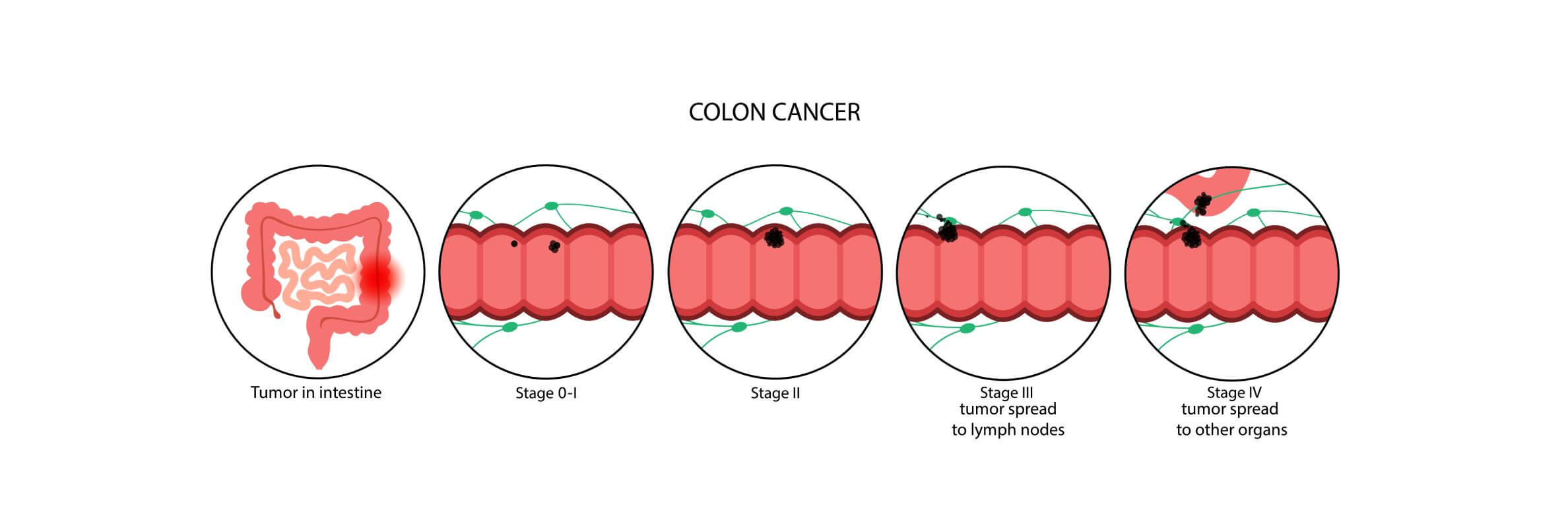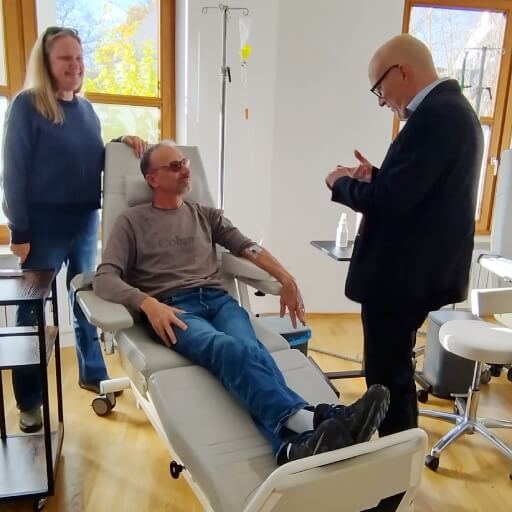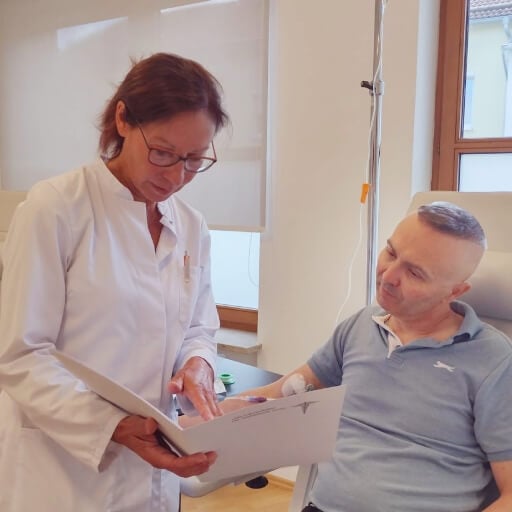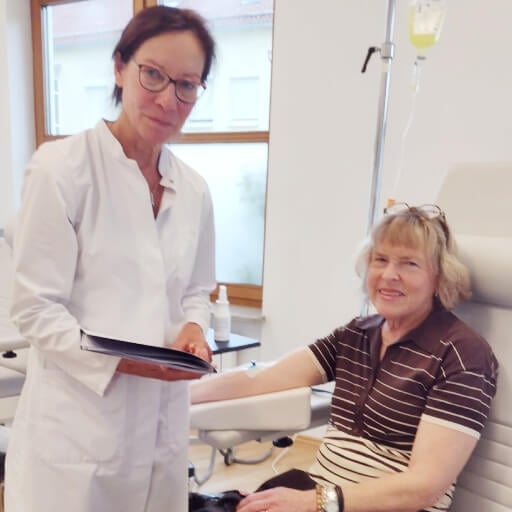Colorectal cancer (CRC), which comprises colon and/or rectum cancer, represents a significant health problem as the world’s third most commonly diagnosed and second most fatal cancer globally [1]. Approximately 9.4% of cancer-related deaths were due to CRC in 2020 [2]. However, in light of the significant increase in the number of identified cases in the older population (especially advanced bowel cancer stages), it is estimated that the global incidence of CRC will more than double by 2035, with the most significant increase occurring in less developed nations [3].
Understanding bowel cancer stages is a key step after a bowel cancer diagnosis. Staging in colorectal cancer allows doctors to determine the depth of invasion in the bowel wall, lymph node involvement and the presence of metastases, which directly affects the prognosis and choice of treatment. Stages of bowel cancer (from early stages of bowel cancer to advanced forms) are assessed using standardized systems (in particular the TNM classification), which is the basis of the modern approach to the management of patients with colorectal cancer.
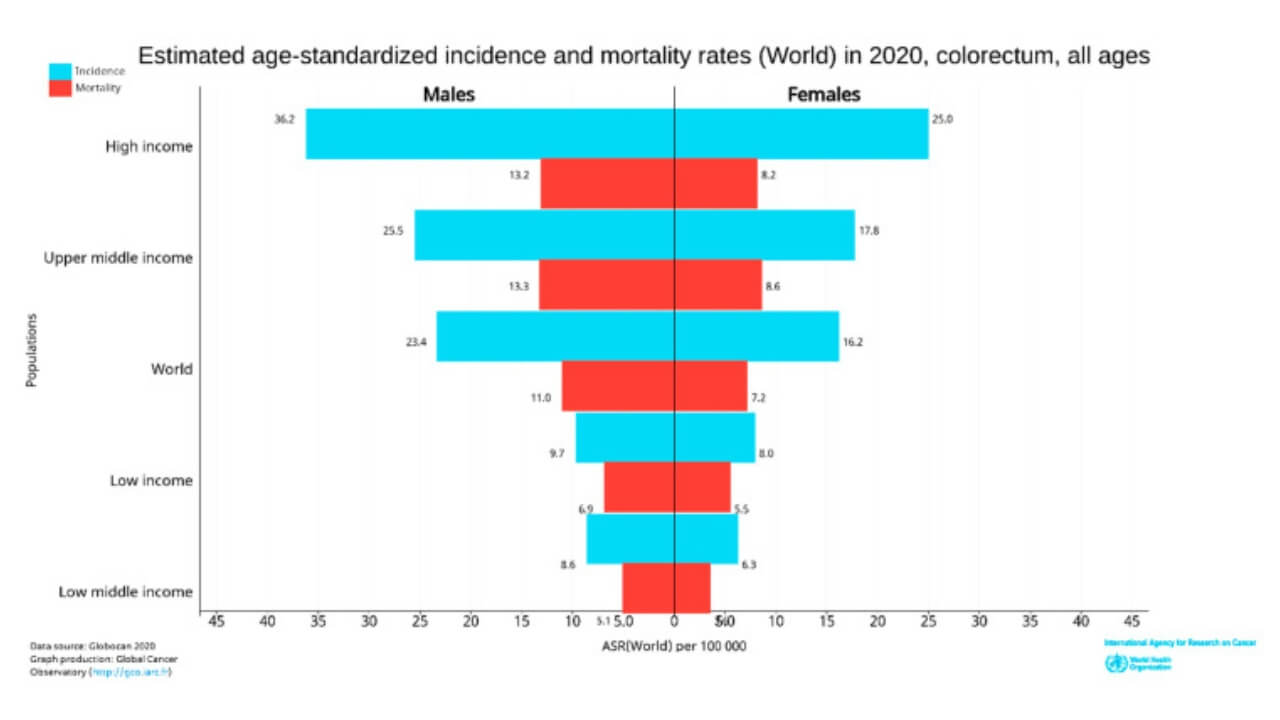
TNM Staging System for Colorectal Cancer
The TNM staging system for colorectal cancer is an internationally recognized standard used for staging in colorectal cancer and allows for an objective assessment of the tumor process prevalence, which reflects symptoms of bowel cancer. This system is the basis of modern adenocarcinoma colon staging, helping doctors determine the prognosis of the disease, the optimal treatment tactics and the feasibility of adjuvant therapy.
TNM classification colorectal cancer reflects three key parameters: the primary tumor (T), the state of regional lymph nodes (N) and the presence of distant metastases (M). Combination of these components forms the colon cancer stages and cancer rectal stages.
Component T: Depth of Tumor Invasion
The parameter T (tumor) describes how deeply the tumor has grown through the layers of the bowel wall, it is key importance for determining the stages of bowel cancer. The bowel wall consists of several anatomical layers: mucosa, submucosa, muscularis propria and serosa.
- Tis - carcinoma in situ, limited to the mucosa
- T1 - invasion of the submucosa
- T2 - involvement of the muscularis propria
- T3 - invasion beyond the muscularis propria into surrounding tissues
- T4 - invasion of the peritoneum or adjacent organs
The deeper the tumor penetrates the layers of the bowel wall the higher the stage of the disease and the risk of systemic spread. This parameter distinguishes early stages of bowel cancer from advanced forms.
Component N: Regional Lymph Node Involvement
The N (nodes) parameter reflects the extent of cancer spread to regional lymph nodes, which is a critical factor of staging in colorectal cancer and the formation of diagnoses (such as stage 3 bowel cancer).
- N0 - no lymph node involvement
- N1 - metastases in 1–3 regional nodes
- N2 - metastases in 4 or more lymph nodes
The presence of positive lymph nodes significantly worsens the prognosis (an indicator of advanced bowel cancer stages) and is usually an indication for systemic chemotherapy after surgical treatment.
Component M: Distant metastases
The M (metastasis) parameter determines whether the cancer has spread beyond the primary site. The presence of metastases is decisive for the establishment of stage 4 bowel cancer.
- M0 - no distant metastases
- M1 - metastases (liver, lungs, peritoneum or other organs)
The presence of metastatic lesions determines the systemic nature of the disease and requires a comprehensive approach. In severe cases, participation in colon cancer clinical trials stage 4 is necessary [5].
The Role of TNM in Colon Cancer Staging
The combination of T, N and M indicators allows doctors to clearly define bowel cancer stages (which are usually grouped into four main colon cancer stages). TNM classification of colorectal cancer is the basis for comparison with other systems such as colorectal cancer staging Dukes, which are used for historical and clinical comparison of treatment results.
Thus, the TNM staging system for colorectal cancer is a fundamental tool of modern oncology, which provides accurate staging of colorectal carcinoma and forms the basis of a personalized approach to the treatment of patients with colorectal cancer.
What are The Stages of Bowel Cancer?
What are the 4 stages of colon cancer? It is a difficult question, and we will try to answer it. Understanding bowel cancer stages helps doctors assess how far a tumor has spread and plan a treatment approach. As we already know staging in colorectal cancer assesses how deep the tumor has grown into the bowel wall, lymph node involvement and whether it has spread to distant sites.
Stage 0 Bowel Cancer (Carcinoma in Situ / CIS)
At this stage, the tumor is confined to the mucosa (Tis, N0, M0) and has not yet spread to deeper layers of the bowel wall. Surgical removal is usually sufficient and the prognosis is favorable.
Stage 1 Bowel Cancer
The tumor has grown into the submucosa or muscle layer (T1–T2, N0, M0), but the lymph nodes are clear. Often, resection of the affected segment of the intestine is sufficient, and additional chemotherapy is not needed. Survival rates are very high. Many patients ask how long does colon cancer stay in stage 1 – early-stage disease can remain localized for a prolonged period before progressing if detected and treated promptly.
Stage 2 Bowel Cancer (2A / 2B / 2C)
At stage 2 bowel cancer, the tumor has grown beyond the muscle layer (T3–T4), but the lymph nodes have not yet been affected (N0, M0). Colon cancer substages 2A, 2B and 2C take into account the depth of the tumor invasion and the local spread of the tumor. Surgery is usually recommended, and in some cases, adjuvant chemotherapy is added to reduce the risk of recurrence.
Stage 3 Bowel Cancer (3A / 3B / 3C)
At this stage, the tumor has affected regional lymph nodes (N1–N2) at any depth (T1–T4, M0). Doctors evaluate the combination of T and N to determine the substage (as this affects the choice of treatment). Systemic chemotherapy is almost always required after surgery. Also doctors discuss how many rounds of chemo for stage 3 colon cancer are needed to create the optimal plan.
Stage 4 Bowel Cancer (metastatic/widespread)
This is the most advanced stage, when distant metastases (M1) are present regardless of tumor size or lymph node involvement [6]. Doctors determine where the cancer has spread and plan a comprehensive treatment, that includes chemotherapy, targeted and immunotherapy approaches. Colorectal cancer prognosis stage 4 remains poor, but modern treatments (dendritic cells, TACE) significantly improve the prognosis.
Discover Modern Treatment Approaches for Stage 4 Colon Cancer
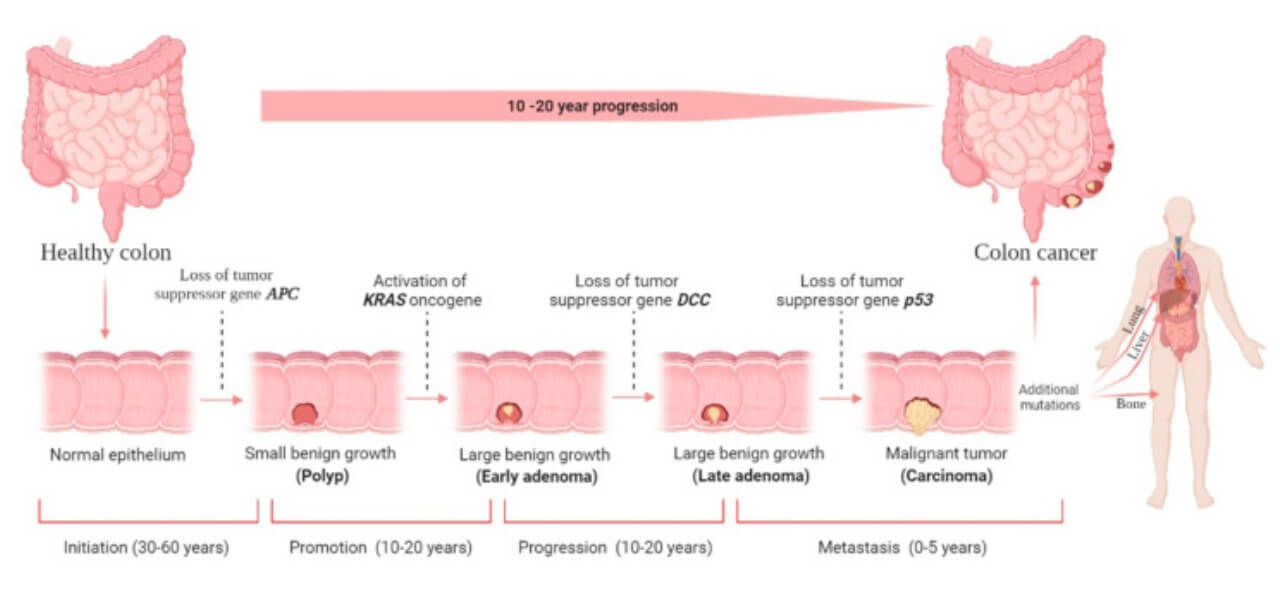
Dukes’ System: Colon Cancer Stages
The Dukes’ staging system is the first historically used method of classifying colorectal cancer, which is now less commonly used but can still be found in medical sources. It divides the disease into four main bowel cancer stages: Dukes A, B, C and D, which roughly correspond to the modern bowel cancer stages 1, 2, 3 and 4.
- Dukes A: the tumor is limited to the mucosa and submucosa without lymph node involvement (Stage 1).
- Dukes B: the tumor extends into or beyond the muscle layer (the lymph nodes are clear (Stage 2).
- Dukes C: regional lymph nodes are involved (Stage 3).
- Dukes D: distant metastases are present (Stage 4).
Although the Dukes rectal cancer staging system is no longer the main one it helps to compare treatment outcomes historically and understand how colorectal cancer was assessed before the advent of the TNM classification.
Bowel Cancer Grading
It is not the same as the stages of bowel cancer which show how far the tumour has spread; the grade helps to assess how aggressive the tumour is. The higher the grade the faster the cells can grow and spread, which directly affects the choice of treatment and prognosis [7–10].
- Grade 1 (low-grade). The cancer cells are very similar to normal cells, grow slowly and rarely metastasize. Doctors look at the structural organisation of the tissue and how different it is from normal mucosa. Impact on treatment: for patients with a low grade (corresponding to early bowel cancer stages), standard surgical resection is often sufficient, sometimes without additional chemotherapy.
- Grade 2 (moderate-grade). The cells are moderately different from normal cells, grow quickly and have a moderate potential to metastasize. Doctors look at whether there is some preservation of normal architecture and how fast the tumour is growing. Impact on treatment: a combination of surgery and systemic treatment may be needed to reduce the risk of recurrence.
- Grade 3 (high-grade). The cells are not similar to normal cells, grow rapidly and often metastasize. The tumor appears chaotic, lacking the structure of normal tissue – which is why this grade is frequently discussed in the context of an end stage bowel cancer timeline (where aggressive tumor behavior is associated with faster disease progression if not effectively controlled). Impact on treatment: requires a more aggressive approach, such as surgery along with chemotherapy or other systemic treatments. High-grade disease is more likely to present at an advanced stage, influencing what stage of colon cancer requires a colostomy bag as part of surgical management.
Hospitals and Сost of Treatment for Colon Cancer Stage 4
When choosing treatment for stage 4 bowel cancer patients need to consider not only the technical capabilities of the clinic but also the experience of the doctors, multidisciplinary approaches and the availability of modern treatment methods. High-tech hospitals use advanced diagnostic systems, that allow for accurate staging in colorectal cancer and provide a full range of procedures: from surgical removal of the tumor to complex methods such as HIPEC or targeted therapy. The choice of treatment procedure depends on the bowel cancer stages.
| Country | Systemic Chemotherapy | HIPEC | Surgery | Dendritic cells |
|---|---|---|---|---|
| Germany | €80,000 – €150,000 full course | €55,000 – €75,000 | €25,000 – €45,000 | €20,000 – €38,000 |
| United Kingdom | €100,000 – €180,000 full course | €112,000 – €150,000 | €65,000 – €85,000 | €100,000 – €150,000 |
| USA | €90,000 – €165,000 full course | €83,000 – €118,000 | €35,000 – €55,000 | Not available |
Prices depend on the type of surgical intervention, the duration of hospitalization, additional procedures and rehabilitation. In each case the medical program may be adjusted after receiving the results of laboratory and instrumental examinations (according to bowel cancer stages), which affects the total costs.
Treatment of stage 4 colon cancer usually involves a comprehensive approach: targeted drugs, possible cytoreductive surgery and regional methods and systemic chemotherapy (the number of cycles depends on individual factors, raising the common question of how many rounds of chemo for stage 4 colon cancer). The correct choice of clinic and treatment method can significantly affect the prognosis and quality of life of the patient, so treatment planning should be entrusted to proven centers with experience in managing stage 4 bowel cancer. Many patients understandably wonder "Сan you recover from stage 4 bowel cancer?", while long-term survival is challenging, tailored treatment can sometimes achieve meaningful remission. To find a clinic that meets high standards of colorectal cancer treatment (depending on bowel cancer stages) you should refer to proven ratings of institutions.
Explore Advanced Treatment Solutions at Top Hospitals in Germany
A Medical Journey: Every Step of the Way With Booking Health
Finding the best treatment strategy for your clinical situation is a challenging task. Being already exhausted from multiple treatment sessions, having consulted numerous specialists, and having tried various therapeutic interventions, you may be lost in all the information given by the doctors. In such a situation, it is easy to choose a first-hand option or to follow standardized therapeutic protocols with a long list of adverse effects instead of selecting highly specialized innovative treatment options.
To make an informed choice and get a personalized cancer management plan, which will be tailored to your specific clinical situation, consult medical experts at Booking Health. Being at the forefront of offering the latest medical innovations for already 12 years, Booking Health possesses solid expertise in creating complex management programs in each individual case. As a reputable company, Booking Health offers personalized treatment plans with direct clinic booking and full support at every stage, from organizational processes to assistance during treatment. We provide:
- Assessment and analysis of medical reports
- Development of the medical care program
- Selection of a suitable treatment location
- Preparation of medical documents and forwarding to a suitable clinic
- Preparatory consultations with clinicians for the development of medical care programs
- Expert advice during the hospital stay
- Follow-up care after the patient returns to their native country after completing the medical care program
- Taking care of formalities as part of the preparation for the medical care program
- Coordination and organization of the patient's stay in a foreign country
- Assistance with visas and tickets
- A personal coordinator and interpreter with 24/7 support
- Transparent budgeting with no hidden costs
Health is an invaluable aspect of our lives. Delegating management of something so fragile yet precious should be done only to experts with proven experience and a reputation. Booking Health is a trustworthy partner who assists you in pursuing stronger health and a better quality of life. Contact our medical consultant to learn more about the possibilities of personalized treatment with innovative methods and with leading specialists in this field.
Fighting Cancer Together: Treatment Journeys with Booking Health
FAQs: Bowel Cancer Stages and Grading
Send request for treatmentThe 4 stages of colon cancer describe how far the tumor has spread. Сolorectal cancer stages include: stage 1 – confined to the inner layers; stage 2 – penetrates deeper; stage 3 – involves lymph nodes; stage 4 – includes distant metastases. Understanding these stages of colon cancer helps plan treatment and predict outcomes.
In early stages of colon cancer the tumor is usually localized and slow-growing. Stage 1 may remain stable for months or even years. Regular monitoring is essential to prevent progression to stage 2 or higher – when cancer cells invade the deeper layers of the bowel wall.
A 7 cm tumor often extends through the muscular layer of the colon, which corresponds to advanced stages of colon cancer (stage 2 or higher). As part of staging in colorectal cancer doctors use imaging and biopsy to assess lymph nodes and possible spread (before final staging).
A colostomy bag is often needed in advanced bowel cancer stages – when surgery removes part of the colon and normal bowel continuity cannot be restored.
Stage 3 colon cancer treatment usually involves around 6 months of adjuvant chemotherapy – split into multiple cycles. Number of rounds depends on: the regimen, patient tolerance and lymph node involvement.
Stage 4 colon cancer treatment options include: systemic chemotherapy, targeted therapy and sometimes surgery. The number of cycles varies depending on: disease response, side effects and colon cancer stages.
Choose treatment abroad and you will for sure get the best results!
Authors:
This article was edited by medical experts, board-certified doctors Dr. Nadezhda Ivanisova, and Dr. Bohdan Mykhalniuk. For the treatment of the conditions referred to in the article, you must consult a doctor; the information in the article is not intended for self-medication!
Our editorial policy, which details our commitment to accuracy and transparency, is available here. Click this link to review our policies.
Sources:
[1] D Papamichael, R A Audisio, B Glimelius et al. Treatment of colorectal cancer in older patients: International Society of Geriatric Oncology (SIOG) consensus recommendations 2013. Ann Oncol. 2015 Mar;26(3):463-76. doi: 10.1093/annonc/mdu253. Epub 2014 Jul 11. [DOI] [PubMed]
[2] John K Triantafillidis, Georgios Nasioulas, Paris A Kosmidis. Colorectal cancer and inflammatory bowel disease: epidemiology, risk factors, mechanisms of carcinogenesis and prevention strategies. Anticancer Res. 2009 Jul;29(7):2727-37. [PubMed]
[3] Brenda K Edwards, Elizabeth Ward, Betsy A Kohler et al. Annual Report to the Nation on the Status of Cancer, 1975–2006, Featuring Colorectal Trends and Impact of Interventions (Risk Factors, Screening, and Treatment) to Reduce Future Rates. Cancer. 2010 Feb 1;116(3):544–573. doi: 10.1002/cncr.24760. [DOI] [PMC free article]
[4] Sanower Hossain, Hidayah Karuniawati, Ammar Abdulrahman Jairouncz et al. Colorectal Cancer: A Review of Carcinogenesis, Global Epidemiology, Current Challenges, Risk Factors, Preventive and Treatment Strategies. Cancers (Basel). 2022 Mar 29;14(7):1732. doi: 10.3390/cancers14071732. [DOI] [PMC free article]
[5] Ahmed Malki, Rasha Abu ElRuz, Ishita Gupta et al. Molecular Mechanisms of Colon Cancer Progression and Metastasis: Recent Insights and Advancements. Int J Mol Sci. 2020 Dec 24;22(1):130. doi: 10.3390/ijms22010130. [DOI] [PMC free article]
[6] Ha Thi Nguyen, Hong-Quan Duong. The molecular characteristics of colorectal cancer: Implications for diagnosis and therapy. Oncol Lett. 2018 Jul;16(1):9-18. doi: 10.3892/ol.2018.8679. Epub 2018 May 9. [DOI] [PubMed]
[7] B Vogelstein, E R Fearon, S R Hamilton et al. Genetic alterations during colorectal-tumor development. N Engl J Med. 1988 Sep 1;319(9):525-32. doi: 10.1056/NEJM198809013190901. [DOI] [PubMed]
[8] J E Payne. International colorectal carcinoma staging and grading. Dis Colon Rectum. 1989 Apr;32(4):282-5. doi: 10.1007/BF02553480. [DOI] [PubMed]
[9] J M Northover. Staging and management of colorectal cancer. World J Surg. 1997 Sep;21(7):672-7. doi: 10.1007/s002689900290. [DOI] [PubMed]
[10] J R Jass. The pathological grading and staging of rectal cancer. Scand J Gastroenterol Suppl. 1988:149:21-38. doi: 10.3109/00365528809096953. [DOI] [PubMed]
Read:
Comprehensive Guide to Colon Cancer Treatment: New and Standard Treatment Options for Bowel Cancer
Colon Cancer Stage 4: Full 4 Stage Bowel Cancer Treatments Guide
Dendritic Cell Therapy for Colon Cancer Treatment in Germany
Article menu:
Don't know where to start?
Contact Booking Health